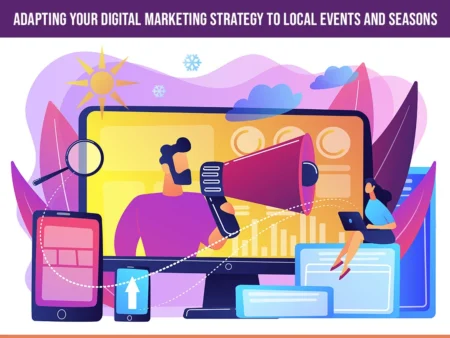 In the ever-evolving landscape of digital marketing, one of the most effective strategies businesses can adopt is aligning their marketing efforts with local events and seasonal trends. This approach not only enhances brand relevance but also ensures a deeper connection with the target audience.
In the ever-evolving landscape of digital marketing, one of the most effective strategies businesses can adopt is aligning their marketing efforts with local events and seasonal trends. This approach not only enhances brand relevance but also ensures a deeper connection with the target audience.
Understanding the Importance
The key to a successful digital marketing strategy lies in its ability to resonate with the audience. Local events and seasons offer a unique opportunity to engage with consumers by tapping into their current interests and experiences. Whether it’s a local festival, a national holiday, or a change in season, these events influence consumer behavior and preferences.
Crafting a Local Event Digital Marketing Strategy
1. Research and Insight: Start by identifying local events and seasonal trends relevant to your business and audience. Understand the cultural significance, timing, and consumer behavior associated with these events.
2. Tailored Content: Develop content that is not only relevant to the event or season but also aligns with your brand’s message. This can range from blog posts and social media updates to special promotions and email marketing campaigns.
3. Community Engagement: Engage with the community by participating in local events or sponsoring activities. This not only increases brand visibility but also demonstrates your commitment to the community.
4. Leveraging Social Media: Use social media platforms to promote your event-related content and engage with your audience. Create event-specific hashtags, run contests, and encourage user-generated content to boost engagement.
5. Local SEO Optimization: Optimize your website and content for local SEO. This includes updating your Google My Business listing, using local keywords, and creating location-specific landing pages.
6. Email Marketing: Tailor your email marketing campaigns to highlight seasonal offerings, promotions, or events. Personalize the content to make it more relevant to your local audience.
7. Adaptability: Be flexible and ready to adapt your strategy based on real-time feedback and analytics. Monitor the performance of your campaigns and adjust your tactics accordingly.
Utilizing Seasonal Marketing
1. Seasonal Calendar Curation: Plan your marketing activities around a seasonal calendar. Identify key dates and periods that are significant for your audience and industry.
2. Relevant Promotions and Offers: Develop promotions and offers that are specific to the season or holiday. This could include discounts, limited-time products, or bundled offers.
3. Emotional Connection: Use the emotional aspect of seasons and holidays to connect with your audience. Create content that evokes nostalgia, joy, or other relevant emotions.
4. Visual Branding: Update your website and social media visuals to reflect the season or local event. This helps create a more immersive experience for your audience.
Challenges and Considerations
While adapting your digital marketing strategy to local events and seasons can be highly effective, it also presents challenges. It’s crucial to be sensitive to cultural nuances and avoid stereotyping. Additionally, ensure that your marketing efforts do not overshadow the event’s significance.
In conclusion, while adapting your digital marketing strategy to local events and seasons is crucial for sustainable growth and a stronger brand presence, partnering with a specialized SEO marketing company can significantly amplify these efforts. ISEOU, a renowned SEO marketing company in the Tampa Bay area, stands out as a strategic partner in this realm. Their expertise in tailoring SEO strategies to the unique needs of businesses in the Tampa Bay area ensures that your brand not only aligns with local events and seasons but also maximizes online visibility and engagement. With ISEOU, you can unlock the full potential of your digital marketing efforts, driving more traffic, leads, and sales.
Picture Credit: Freepik

